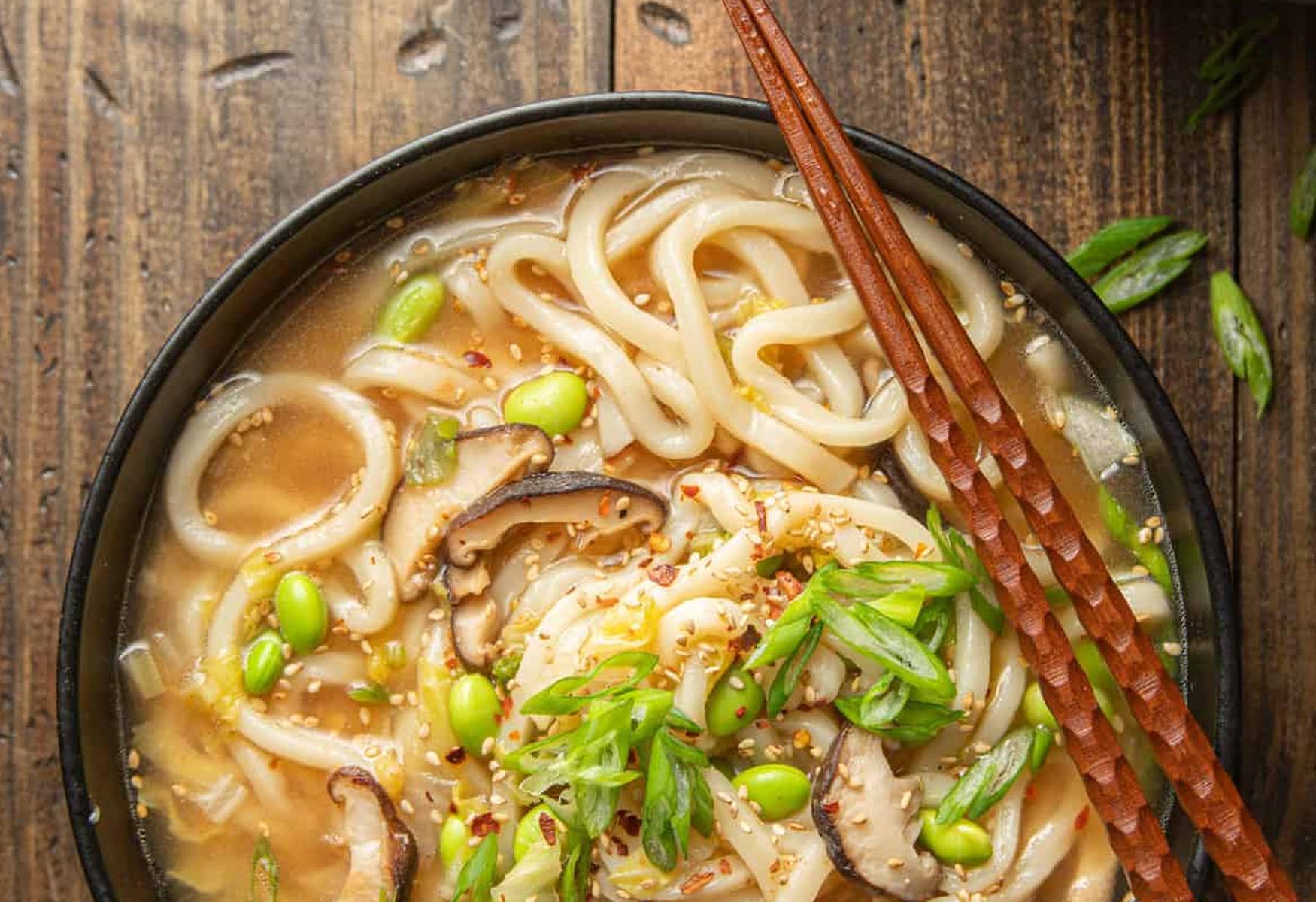
Udon noodles have been a staple in Japanese cuisine for centuries, loved for their versatility and delicious taste. These thick, chewy noodles are made from wheat flour and water, making them a popular choice for a satisfying and comforting meal. But did you know that udon noodles also offer numerous nutritional benefits? In this article, we will dive into the world of udon nutrition facts, exploring the vitamins, minerals, and health benefits that these noodles provide. Whether you are a fan of Japanese cuisine or simply looking to incorporate more nutritious foods into your diet, understanding the nutritional profile of udon noodles will help you make informed choices about your meals. So, let’s dig in and discover the wealth of goodness that udon noodles have to offer!
Key Takeaways:
- Udon noodles are a versatile and filling option in Japanese cuisine, offering protein, B vitamins, and iron. Enjoy them in soups, stir-fries, or noodle salads for a delicious and nutritious meal.
- Udon noodles are low in fat and cholesterol, making them a healthier noodle choice. They are easy to prepare and can be enjoyed hot or cold, providing comfort and satisfaction in every bite.
Udon noodles are a type of thick, wheat-based noodle.
Udon noodles are a staple in Japanese cuisine and are made from wheat flour, salt, and water. They have a chewy texture and a neutral taste, making them versatile for various dishes.
Udon noodles are low in fat and cholesterol.
One of the health benefits of udon noodles is that they are low in fat and cholesterol, making them a healthier option compared to other noodle varieties. They are generally considered a good source of complex carbohydrates.
Udon noodles are high in calories.
Due to their wheat-based composition, udon noodles are relatively high in calories. One serving of cooked udon noodles contains approximately 200-250 calories, depending on the brand and preparation method.
Udon noodles are a good source of protein.
Udon noodles provide a decent amount of protein, which is essential for building and repairing tissues in the body. One cup of cooked udon noodles offers around 8-10 grams of protein.
Udon noodles are a good source of B vitamins.
Udon noodles contain various B vitamins, including thiamine (B1), riboflavin (B2), niacin (B3), and folate (B9). These vitamins play a vital role in energy production, brain function, and cell growth.
Udon noodles are high in carbohydrates.
Udon noodles are rich in carbohydrates, providing a quick source of energy. They are an excellent choice for athletes or individuals who engage in high-intensity physical activities.
Udon noodles are low in sodium.
Compared to other types of noodles, udon noodles are relatively low in sodium. However, the sodium content may vary depending on the brand and the sauce or broth used in the dish.
Udon noodles are gluten-friendly.
Although udon noodles are made from wheat flour, they can be suitable for individuals with mild gluten sensitivity or intolerance. However, people with celiac disease should opt for gluten-free alternatives.
Udon noodles are a good source of iron.
Iron is an essential mineral that helps transport oxygen throughout the body. Udon noodles provide a significant amount of iron, contributing to overall health and wellbeing.
Udon noodles can be enjoyed in various dishes.
Udon noodles are incredibly versatile and can be enjoyed in a wide range of dishes, such as soups, stir-fries, and noodle salads. They absorb flavors well, making them a popular choice in Japanese and Asian cuisine.
Udon noodles are a filling and satisfying meal option.
Due to their thick and chewy texture, udon noodles are known for their ability to keep you feeling full and satisfied for longer periods. They can be a satisfying meal option on their own or as part of a larger dish.
Udon noodles are easy to prepare.
Whether store-bought or homemade, udon noodles are relatively easy to prepare. They require a simple cooking process, usually involving boiling the noodles until they reach the desired tenderness.
Udon noodles can be enjoyed hot or cold.
Udon noodles can be served hot in a flavorful broth or cold as part of a refreshing noodle salad. Their versatility makes them suitable for any season or preference.
Udon noodles are a popular comfort food.
In Japan, udon noodles are often regarded as a comforting and soul-warming dish. Many locals enjoy a hot bowl of udon noodles during colder months or when seeking a comforting meal.
Udon noodles can be a part of a balanced diet.
When enjoyed in moderation and as part of a well-balanced diet, udon noodles can be a delicious and nutritious addition to your meals. Pair them with plenty of vegetables, lean proteins, and healthy fats for a well-rounded dish.
15 Udon Nutrition Facts – Conclusion:
Udon noodles are a popular choice in Japanese cuisine due to their versatile nature and comforting flavor. They provide various nutrients, including protein, B vitamins, and iron, while remaining relatively low in fat and cholesterol. Whether enjoyed in soups, stir-fries, or noodle salads, udon noodles can be a delicious and filling addition to your meals. Just remember to consume them in moderation and as part of a balanced diet for optimal health benefits.
Conclusion
In conclusion, udon noodles are not only delicious but also offer several health benefits. They are low in calories and fat, making them a great option for weight management. Additionally, udon noodles are a good source of carbohydrates, providing the body with energy and promoting satiety. They also contain essential minerals such as iron, calcium, and phosphorus, which are crucial for maintaining strong bones and overall wellbeing. Whether you enjoy them in a hot bowl of soup or stir-fried with vegetables and protein, udon noodles can be a nutritious addition to your diet. So go ahead and indulge in this tasty and wholesome Japanese specialty!
FAQs
Q: Are udon noodles gluten-free?
A: Unfortunately, traditional udon noodles are made from wheat flour and are not gluten-free. However, there are gluten-free udon options available, typically made from alternative flours such as rice or buckwheat.
Q: How should I store udon noodles?
A: It is best to store udon noodles in an airtight container in a cool, dry place. If you have cooked udon noodles leftover, store them in the refrigerator for up to 3 days. Make sure to keep them separate from any broth or sauce to prevent them from getting soggy.
Q: Can udon noodles be reheated?
A: Yes, udon noodles can be reheated by briefly dipping them in boiling water or adding them to a hot broth. However, be careful not to overcook them as they can become too soft. It is best to reheat them just until heated through.
Q: Are udon noodles suitable for a vegan diet?
A: Yes, udon noodles are typically vegan-friendly as they are made from plant-based ingredients such as wheat flour, water, and salt. However, always check the ingredient list or consult the manufacturer to ensure there are no additional animal-derived ingredients.
Q: Can udon noodles be used in cold dishes?
A: Absolutely! Udon noodles can be enjoyed in both hot and cold preparations. They can be added to cold salads, served with a chilled dipping sauce, or transformed into a refreshing noodle salad. The versatility of udon noodles makes them a perfect choice for various culinary creations.
Was this page helpful?
Our commitment to delivering trustworthy and engaging content is at the heart of what we do. Each fact on our site is contributed by real users like you, bringing a wealth of diverse insights and information. To ensure the highest standards of accuracy and reliability, our dedicated editors meticulously review each submission. This process guarantees that the facts we share are not only fascinating but also credible. Trust in our commitment to quality and authenticity as you explore and learn with us.


